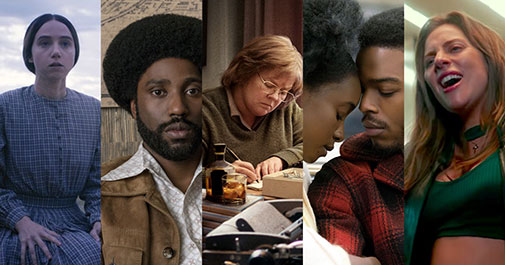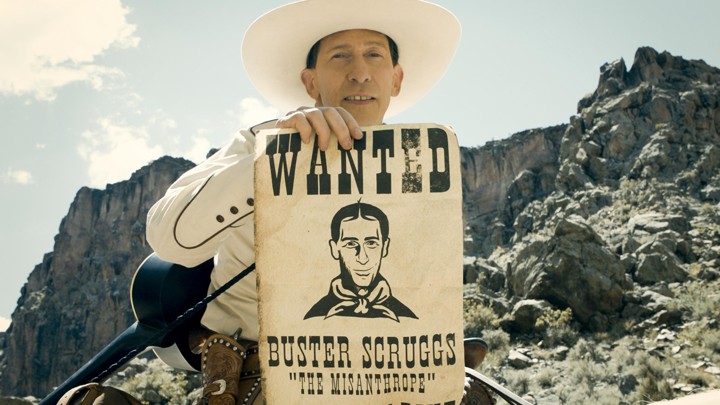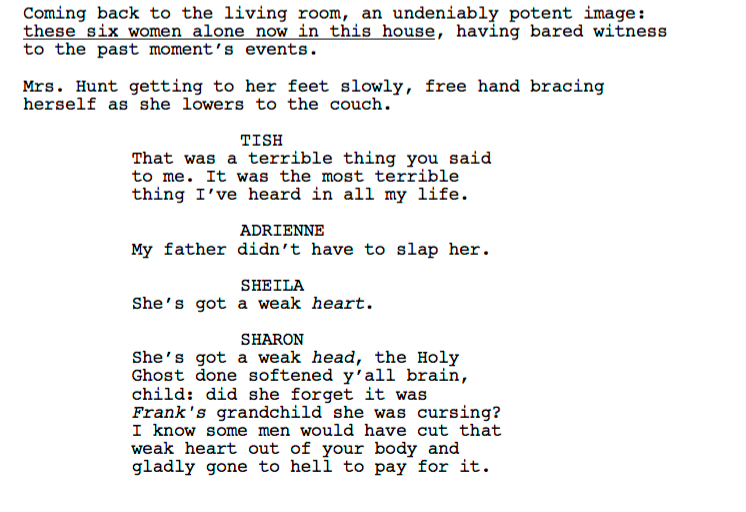by Jorge Molina

Last week we dove into the nominees for Original Screenplay. Unlike that category, which feels up in the air with a batch of uneven contenders, the adapted nominees reflect a much richer group of screenplays overall. From the pitch-perfect blending of genres and race-commentary in BlackKklansman, to the lyricism and poetry of If Beale Street Could Talk, and from the snark and melancholy in Can You Ever Forgive Me?, to the dark ironies that permeate through all the tales in The Ballad of Buster Scruggs, andthe interpersonal relationships against the backdrop of superstardom in A Star Is Born, each nominee says what it needs to say in a way only it could have. Let’s have a look at each of the nominees...

The Ballad of Buster Scruggs
(Read the full script here)
Written by: Joel & Ethan Coen
Based on: The short stories All Gold Canyon by Jack London, The Gal Who Got Rattled by Stewart Edward White, and short stories by the Coen Brothers
The elevator pitch: Six tales of life and violence in the Old West, following a singing gunslinger, a bank robber, a traveling impresario, an elderly prospector, a wagon train, and a perverse pair of bounty hunters.
Screenplay length: 116 pp
Oscar History: This is the sixth Oscar nomination for the Coens in the Writing categories. They’ve won it twice before, in 1996 for Fargo in Original and 2007 for No Country for Old Men in Adapted. They were also nominated in 2000 for O Brother, Where Art Thou?, in 2009 for A Serious Man, in 2010 for True Grit and in 2015 for Bridge of Spies. They have multiplewins and nominations in other categories as well, winning Best Director and Best Picture for No Country for Old Men.
Memorable scene: In one of the stories, an Irishman handles a travelling performing act, headlined by a crippled actor. After he makes a bad investment decision with the newest sideshow trend, he must make a choice in order to survive.

***

BlacKkKlansman
(Read the full script here)
Written by: Spike Lee, David Rabinowitz, Charlie Wachtel & Kevin Willmott
Based on: The memoir Black Klansman by Ron Stallworth
The elevator pitch: Ron Stallworth, an African American police officer from Colorado Springs, CO, successfully manages to infiltrate the local Ku Klux Klan branch with the help of a Jewish surrogate who eventually becomes its leader. Based on actual events.
Screenplay length: 145 pp
Oscar History: First Oscar nomination for David Rabinowitz, Charlie Wachtel and Kevin Willmott but this is Spike Lee’s second nomination in the Writing category, 29 years after Do the Right Thing in 1989. He was also nominated in Best Documentary Feature for 4 Little Girls in 1996, and received an Honorary Oscar in 2016. This year he has three nominations as he's also up for Best Director and Best Picture.
Memorable scene: Not revealing he’s been working as an undercover for the klan, Ron Stallworth attends a rally at a black student union where activist Kwame Ture is giving a rousing speech about black power and identity.

***

Can You Ever Forgive Me?
(Read the full script here)
Written by: Nicole Holofcener & Jeff Whitty
Based on: The memoir of the same name by Lee Israel
The elevator pitch: When Lee Israel falls out of step with current tastes, she turns her art form to deception.
Screenplay length: 120 pp
Oscar History: First Oscar nomination for Jeff Whitty and Nicole Holofcener (I know).
Memorable scene: After Lee’s criminal life led her unlikely (and only) friend Jack betray her, they meet up one last time after a while to patch up grudges, or feed them.

***

If Beale Street Could Talk
(Read the full script here)
Written by: Barry Jenkins
Based on: The novel of the same name by James Baldwin
The elevator pitch: A woman in Harlem embraces her pregnancy while she and her family struggle to prove her fiancé innocent of a crime.
Screenplay length: 106 pp
Oscar History: Barry Jenkins previously won this same category in 2016 for the screenplay of Moonlight, which he shared with Tarell Alvin McCraney. That year he was also nominated for Directing.
Memorable scene: After finding out she is pregnant, Tish invites the family of her boyfriend (who is currently in prison) for a family dinner. As he breaks them the happy news, everyone copes with the situation differently.

***

A Star Is Born
(Read the full script here)
Written by: Bradley Cooper, Will Fetters & Eric Roth
Based on: the 1954 film written by Moss Hart, the 1976 film written by Joan Didion, John Gregory Dunne & Frank Pierson, and a story by Robert Carson & William A. Wellman.
The elevator pitch: A musician helps a young singer find fame, even as age and alcoholism send his own career into a downward spiral.
Screenplay length:137 pp
Oscar History: First writing nomination for Will Fetters. This is Eric Roth’s fifth writing Oscar nomination. He won in 1994 for Forrest Gump and was nominated in 1999 for Inside Man (shared with Michael Mann), in 2005 for Munich (shared with Tony Kushner), and in 2008 for The Curious Case of Benjamin Button. This is Bradley Cooper’s first Oscar nomination in the Writing category, but he has four acting nominations for Silver Linings Playbook (2012), American Hustle (2013), American Sniper (2014) and this film.
Memorable scene: As Ally’s star rises and Jackson Maine’s declines, they have an intimate confrontation in a bathtub in which they use each other’s insecurities against them.

 Who Should Win: There's not a bad choice in here. Even the weakest (which in my opinion is A Star is Born) has rich and deep characters and an interesting dynamic throughout. I’d love for Can You Ever Forgive Me? to get some sort of recognition somewhere, and if Richard E. Grant is unlikely to happen, why not here? The script is such a complex portrayal of queerness, loneliness, melancholy, and personal fulfillment so specific that I’ve literally never seen it done before. Unlike some of the other nominees, I think this is the one where the script (its use of language, its relationship with words and literature) shines the brightest, and that's why it deserves the win the most.
Who Should Win: There's not a bad choice in here. Even the weakest (which in my opinion is A Star is Born) has rich and deep characters and an interesting dynamic throughout. I’d love for Can You Ever Forgive Me? to get some sort of recognition somewhere, and if Richard E. Grant is unlikely to happen, why not here? The script is such a complex portrayal of queerness, loneliness, melancholy, and personal fulfillment so specific that I’ve literally never seen it done before. Unlike some of the other nominees, I think this is the one where the script (its use of language, its relationship with words and literature) shines the brightest, and that's why it deserves the win the most.
Will Win: As it is with a few of the Oscar races this year, it could feasibly go to any of the nominees, but BlacKkKlansman appears to have the most widespread support as a film, and it is unlikely that it will be rewarded anywhere else. This, then, would be a great place to celebrate it.
Related: Vote on who should win the categories on the Oscar charts